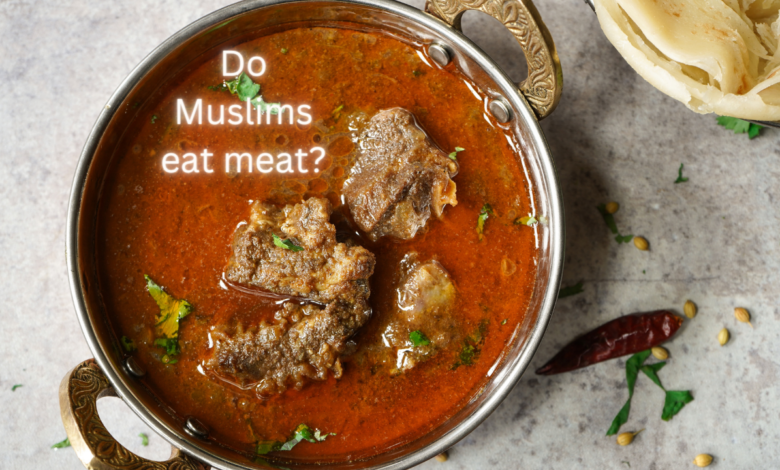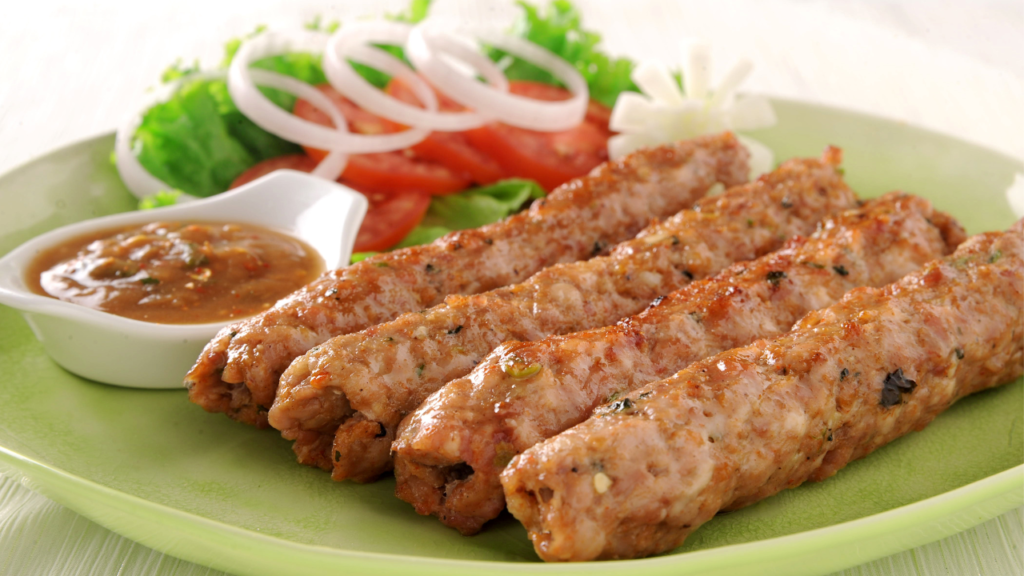
Do Muslims eat meat?
No, not all Muslims eat meat. Dietary choices among Muslims vary based on personal preferences, cultural backgrounds, and religious beliefs. Some Muslims are vegetarians or choose to avoid specific types of meat.

Introduction
The dietary practices of Muslims are deeply rooted in their faith and cultural traditions. Among the many aspects of Islamic dietary law (halal), the consumption of meat holds a significant place. Halal, which means “permissible” in Arabic, sets forth guidelines for what is considered lawful to consume in Islam. While it is true that Muslims eat meat, their consumption is subject to specific rules and ethical considerations that ensure the food is both permissible and prepared in a manner consistent with Islamic principles.
Halal Meat: The Basics
- Slaughter Process:
- One of the fundamental principles of halal meat is the method of slaughter. Muslims are required to consume meat from animals that have been slaughtered in a specific way, known as “zabiha” or “dhabiha.” This method involves a trained Muslim slaughtering the animal by swiftly cutting its throat while invoking the name of Allah (God). This process is believed to minimize pain and suffering for the animal and is considered a humane way to obtain meat.
- Forbidden Meats:
- There are specific types of meats that are strictly prohibited (haram) in Islam. These include pork and its by-products, as well as the flesh of animals that have died of themselves, been strangled, or killed by another animal. Additionally, any meat that is not slaughtered according to Islamic principles is considered haram.
- Specific Dietary Rules:
- Muslims are encouraged to eat a balanced diet that includes various types of halal meat, such as beef, lamb, chicken, and goat. The dietary restrictions are generally more concerned with how the meat is sourced and prepared rather than the type of animal.
Ethical Considerations
- Compassion for Animals:
- Islamic dietary practices place a strong emphasis on treating animals with kindness and respect. The humane method of slaughter in zabiha is intended to minimize suffering for the animal. Additionally, Muslims are encouraged to ensure the well-being of the animals raised for meat, providing them with appropriate living conditions and food.
- Avoiding Waste:
- Islam also teaches Muslims to be mindful of waste and excess. This principle extends to the consumption of meat. Muslims are encouraged to avoid wasteful practices and only consume what is necessary.
Cultural Variations
It’s important to note that dietary practices can vary among Muslims depending on their cultural background, regional customs, and personal preferences. While the core principles of halal meat remain consistent, you may find variations in the types of meat dishes, seasonings, and cooking methods in different Muslim communities worldwide.
Also Check
- What is the difference between Islam and Muslim?
- Can Muslims touch dogs?
- Where are the 25 Prophets of Islam in order?
- How to Greet in Muslim?
- How to become a Islamic Scholar?
Conclusion
In summary, Muslims do eat meat, but their consumption is subject to specific dietary rules and ethical considerations outlined in Islamic law. Halal meat is obtained through a humane slaughter process, and Muslims are required to avoid forbidden meats, such as pork, and ensure that the animals are treated with compassion and respect. These principles not only guide the dietary habits of Muslims but also reflect their commitment to ethical and responsible consumption.

FAQs About Muslims and Meat Consumption
Do all Muslims eat meat?
No, not all Muslims eat meat. Dietary choices among Muslims vary based on personal preferences, cultural backgrounds, and religious beliefs. Some Muslims are vegetarians or choose to avoid specific types of meat.
Is it a requirement for Muslims to eat meat?
No, it is not a requirement for Muslims to eat meat. Islam allows the consumption of halal (permissible) meat, but it does not mandate the consumption of meat. Muslims are encouraged to be mindful of their dietary choices and ensure their food is halal if they do eat meat.
What is halal meat, and why do some Muslims prefer it?
Halal meat is meat prepared according to Islamic dietary laws. It involves specific slaughtering practices, including the recitation of a prayer and the use of a sharp knife to ensure a humane and quick death for the animal. Some Muslims prefer halal meat because it aligns with their religious beliefs.
Can Muslims eat any type of meat as long as it’s halal?
Generally, Muslims can eat any type of meat that is halal. However, there are exceptions, such as pork and its by-products, which are strictly forbidden (haram) in Islam. Additionally, Muslims may have personal preferences for certain types of halal meat or may avoid meats based on cultural or health considerations.
Are there specific times or occasions when Muslims are more likely to consume meat?
Yes, Muslims may consume meat on special occasions and celebrations, such as Eid al-Adha, which is also known as the “Festival of Sacrifice.” During this holiday, Muslims often sacrifice an animal (usually a sheep, goat, cow, or camel) as a religious ritual, and the meat is distributed among family, friends, and those in need.
Can Muslims eat meat slaughtered by non-Muslims?
Muslims are allowed to eat meat slaughtered by non-Muslims as long as the meat meets the criteria of being halal. This includes proper slaughter methods and the absence of any haram (forbidden) elements in the meat.
Do all Muslims follow the same dietary guidelines regarding meat?
No, dietary practices can vary among Muslims depending on their interpretation of Islamic teachings, cultural traditions, and personal choices. While there are common principles, there may be differences in how individuals or communities approach meat consumption.
Are there vegetarian or vegan Muslims?
Yes, there are vegetarian and vegan Muslims who choose to abstain from meat and animal products for various reasons, including ethical, environmental, or health concerns. Their dietary choices are not contradictory to Islamic beliefs.
Are there any health benefits associated with halal meat consumption?
Halal meat consumption is primarily a religious practice, but some argue that the method of slaughtering and the emphasis on cleanliness and humane treatment of animals may have potential health benefits. However, the health benefits would depend on various factors, including the overall diet and lifestyle of the individual.
Is it disrespectful to serve pork or alcohol to Muslims?
Yes, it is considered disrespectful to serve pork or alcohol to Muslims, as both are strictly prohibited in Islam. It’s important to be mindful of dietary restrictions when hosting Muslim guests or participating in multicultural settings.






